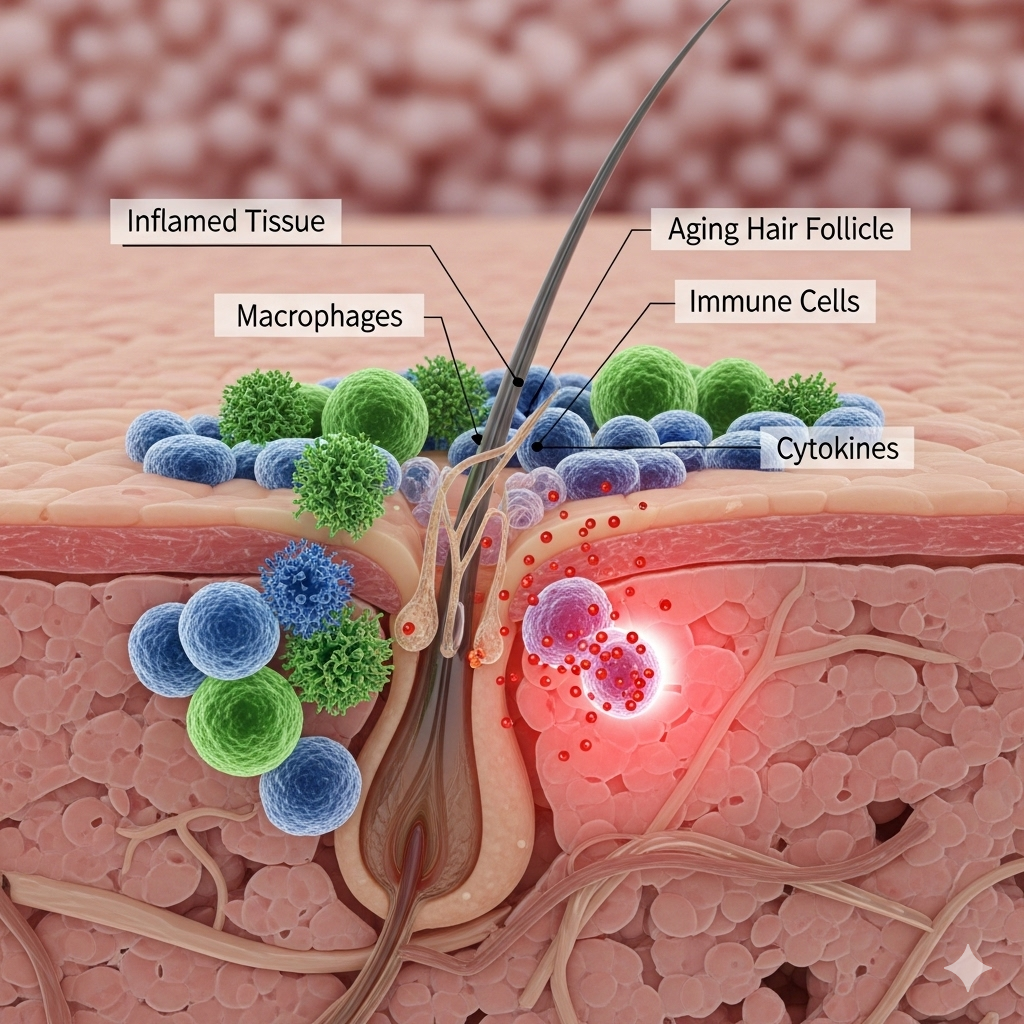Hair thinning and loss are often attributed to genetics, hormones, and environmental stressors. But research increasingly points to another, less obvious culprit: chronic inflammation. While inflammation is a natural part of the body’s defense system, persistent low-grade inflammation can accelerate the aging of hair follicles—shortening their active growth phase and leading to progressive thinning.
At ZMD Hair, we focus on uncovering the root causes of hair loss so our patients can receive targeted, effective solutions. In this blog, we explore the science behind chronic inflammation, its role in hair follicle aging, and how addressing it can help preserve healthy hair.
What Is Chronic Inflammation?
Inflammation is your body’s way of responding to injury, infection, or irritation. In the short term, it’s protective—immune cells rush to the site of damage, clear debris, and promote healing. This is known as acute inflammation.
Chronic inflammation, however, is different. It’s a lingering, low-level immune response that can last for months or years. Instead of helping tissue heal, it gradually damages healthy cells, disrupts normal functions, and accelerates aging processes throughout the body—including in the hair follicle.
How Chronic Inflammation Affects Hair Follicles
Hair follicles are mini-organs that go through cyclical phases: anagen (growth), catagen (transition), and telogen (resting/shedding). These cycles are regulated by a complex interplay of genetic, hormonal, and environmental signals. Chronic inflammation disrupts this delicate balance in several ways:
Follicular Stem Cell Damage
Hair follicles rely on a reservoir of stem cells to regenerate hair during each growth cycle. Chronic inflammation exposes these cells to inflammatory cytokines and oxidative stress, which can impair their ability to divide and regenerate hair shafts.
Premature Follicle Miniaturization
Inflammatory mediators such as prostaglandins can signal follicles to shrink. Over time, these miniaturized follicles produce thinner, shorter hairs, eventually leading to visible hair thinning—a process similar to what occurs in androgenetic alopecia but driven or accelerated by inflammation.
Disruption of the Anagen Phase
Inflammation can trigger early termination of the anagen phase, pushing follicles into the resting or shedding phase prematurely. This reduces the total time hair spends actively growing, lowering overall density.
Microvascular Impairment
Persistent inflammation can affect the tiny blood vessels supplying the follicle, limiting oxygen and nutrient delivery. Without adequate nourishment, follicles weaken and hair quality declines.
Causes of Chronic Scalp Inflammation
Chronic inflammation can develop from systemic health issues or local scalp conditions. Common contributors include:
- Autoimmune disorders such as lupus or alopecia areata
- Chronic skin conditions like seborrheic dermatitis or psoriasis
- Poor scalp hygiene leading to buildup of sebum and microbial overgrowth
- Nutritional deficiencies that compromise immune regulation
- Environmental stressors such as pollution and UV exposure
- Lifestyle factors including smoking, poor diet, and chronic stress
Because inflammation can be both systemic and localized, addressing it often requires a holistic approach.
What the Research Says
Scientific studies have found strong links between inflammation and hair loss:
- Histological analyses of balding scalps often show immune cell infiltration around hair follicles, suggesting ongoing inflammatory activity.
- In scarring alopecia, chronic inflammation directly destroys the follicle structure, preventing regrowth.
- Even in non-scarring conditions, inflammatory biomarkers have been detected at higher levels in affected areas compared to healthy scalp tissue.
- Research into oxidative stress—a byproduct of chronic inflammation—has shown that it accelerates aging in both skin and hair follicle cells.
These findings indicate that controlling inflammation may help slow or even reverse aspects of hair follicle aging.
Strategies to Reduce Chronic Inflammation for Healthier Hair
Addressing chronic inflammation involves both medical treatments and lifestyle changes. At ZMD Hair, we tailor anti-inflammatory strategies to each patient’s needs.
Medical Interventions
- Topical anti-inflammatory treatments such as corticosteroids or non-steroidal options can calm localized scalp inflammation.
- Platelet-Rich Plasma (PRP) therapy has shown potential to reduce inflammatory markers while stimulating growth factors.
- Low-Level Laser Therapy (LLLT) may promote cellular repair and improve circulation in inflamed scalp tissue.
- Targeted medications for autoimmune-related hair loss may be prescribed when necessary.
Nutritional Support
- Omega-3 fatty acids (from fish or flaxseed oil) help modulate inflammatory pathways.
- Antioxidant-rich foods like berries, leafy greens, and green tea combat oxidative stress.
- Adequate intake of vitamin D, zinc, and biotin supports scalp and follicle health.
Lifestyle Adjustments
- Managing stress through meditation, yoga, or breathing exercises reduces cortisol-driven inflammation.
- Quitting smoking and reducing alcohol intake can improve vascular and immune health.
- Gentle scalp care and avoiding harsh chemical treatments minimize local irritation.
Integrating Anti-Inflammatory Care into Hair Restoration
While reducing inflammation is important on its own, it becomes even more powerful when integrated into a comprehensive hair restoration plan. At ZMD Hair, we combine inflammation control with proven growth-stimulating techniques such as FUE hair transplantation, PRP therapy, and nutritional optimization.
By creating an environment where follicles are protected from ongoing damage, we not only improve the chances of successful regrowth but also enhance the longevity of transplanted hair.
Conclusion: Calm the Fire, Protect the Follicle
Chronic inflammation may be a silent but significant factor in hair follicle aging. Left unchecked, it can accelerate thinning, reduce hair quality, and make restoration more challenging. The good news is that with the right approach—targeting both systemic and scalp-specific inflammation—you can protect your follicles, support regeneration, and slow the aging process.
At ZMD Hair, we believe in addressing hair loss at its source. If you suspect inflammation is contributing to your thinning hair, we can help identify the cause and create a personalized plan that blends medical science with holistic care.
Don’t wait for more hair to be lost.
📞 Call ZMD Hair or visit zmdhair to schedule your consultation today. Let’s put out the fire of inflammation and give your follicles the healthy environment they need to thrive.




